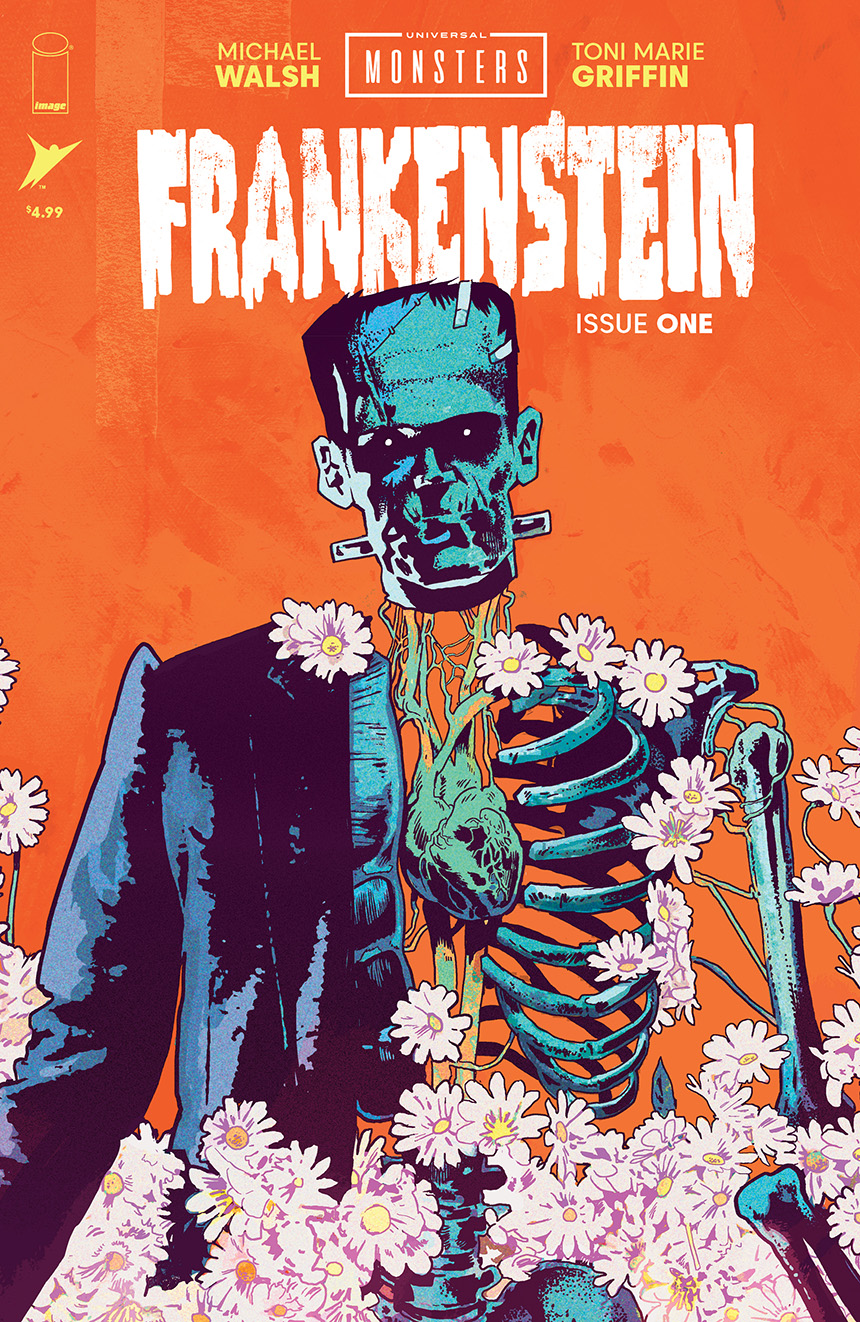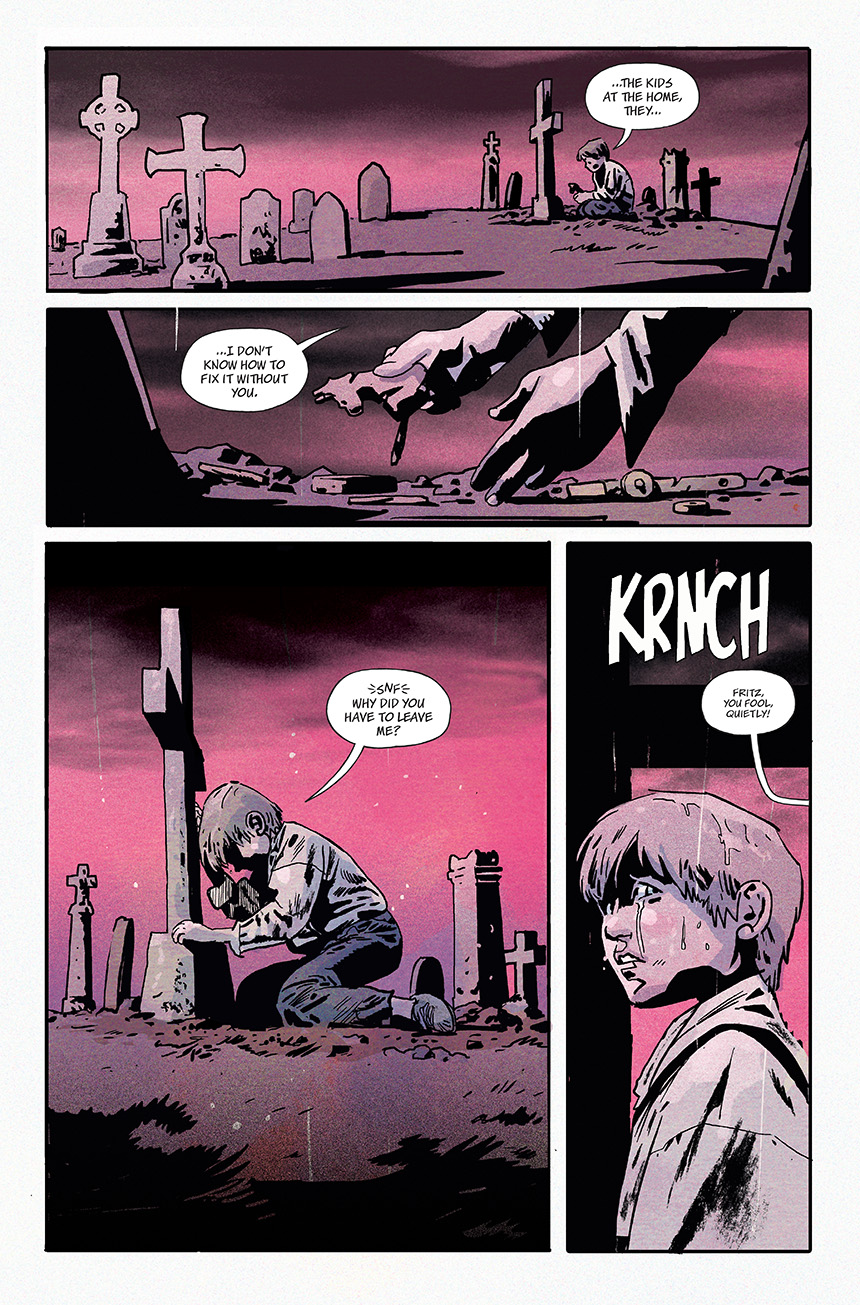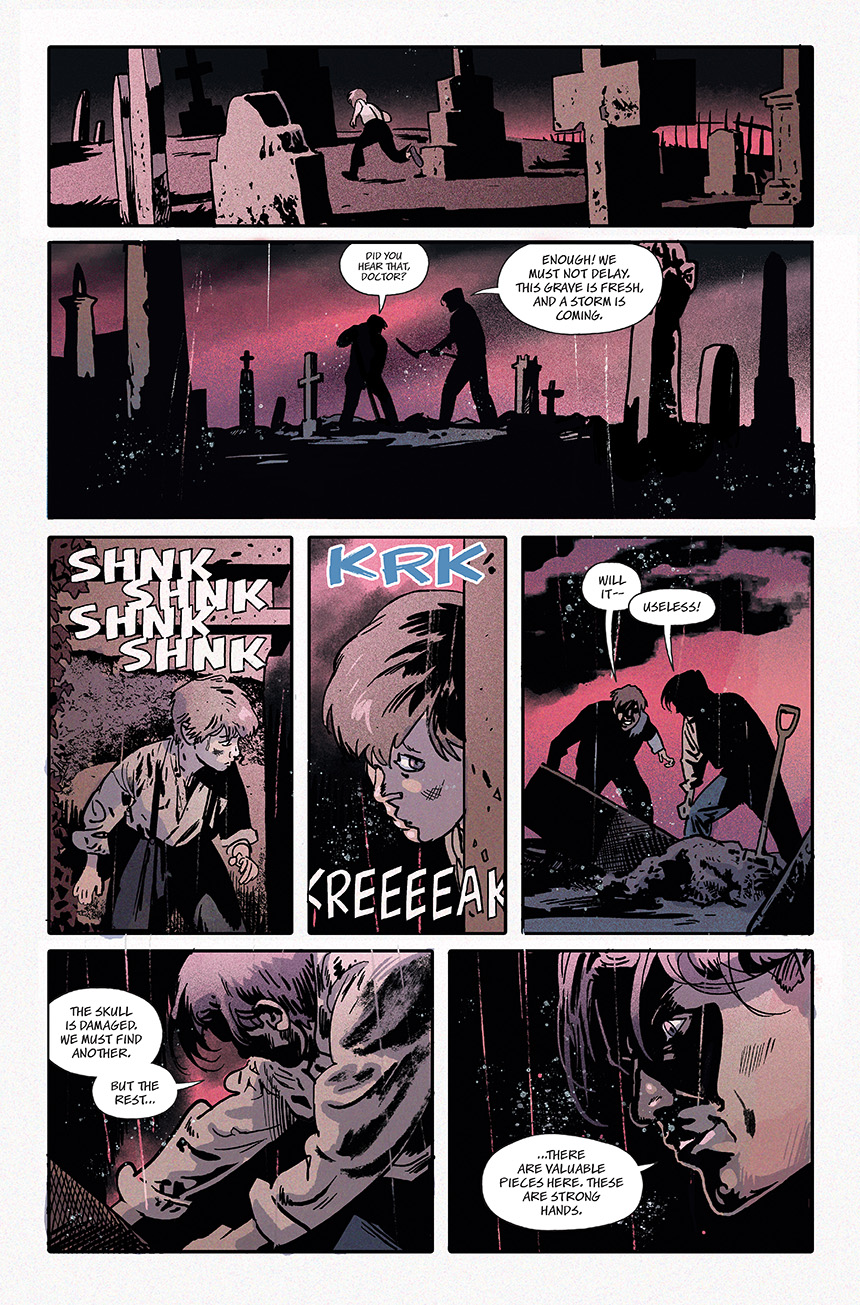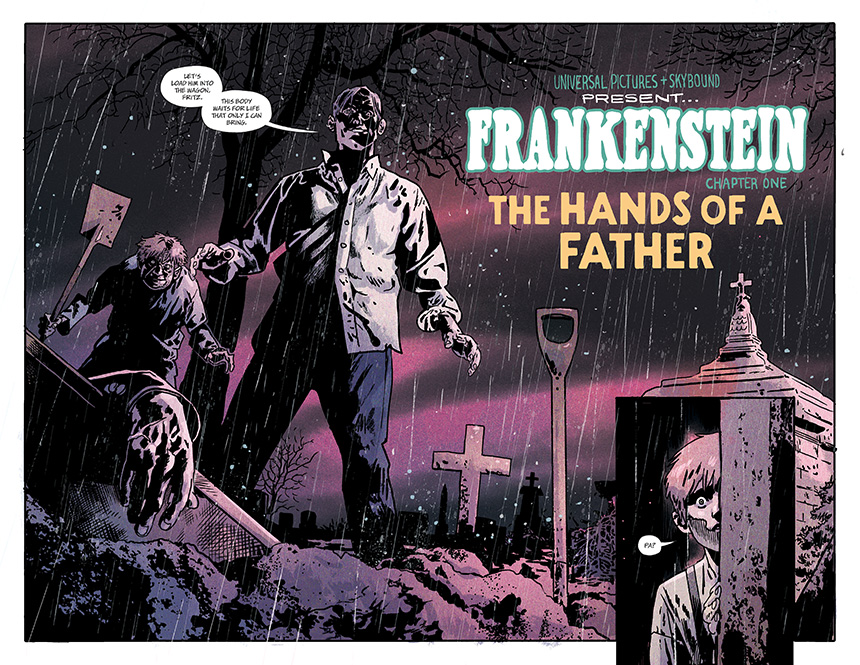While many of the Universal Monsters films are stone-cold classics, director James Whale's 1931 Frankenstein and its 1935 sequel Bride of Frankenstein are the studio's Crown Jewels. The standard by which all other monster movies are measured. Having inspired everyone from Mel Brooks to Guillermo del Toro, they're also limitless in their influence. That's why we here at Skybound are especially proud of this week's release of Universal Monsters: Frankenstein, written and illustrated by Michael Walsh (of Creepshow: Joe Hill's Wolverton Station fame). We recently sat down with Michael to learn what went into the book's making. Here's what he had to tell us...
When did you discover James Whale’s Frankenstein and Bride of Frankenstein? Have you been a lifelong fan?
I was actually terrified of horror stuff as a little kid. But then as I got older, and I started to watch more and read more in the genre. I did a deep dive in high school, probably around 15, and I watched a bunch of the classic horror films that really shaped the genre visually and thematically. I would have seen Frankenstein then. So many years ago now, but it’s kind of just wormed its way into my storytelling DNA subconsciously. The way that there's so much negative space, and there's a verticality, the way that all the different scenes are framed. It's just a beautiful film. I've taken a lot of the way that it's shot into my horror work, whether it's conscious or not. So I've been a fan of it for a very, very long time.
What’s the elevator pitch for this book?
This is the story of how the monster was made from a brand-new perspective, and you're getting pieces of its creation that you've never seen before. So it's great for new fans and for old fans who are getting to see this story in a whole new light.

All of Skybound’s Universal Monsters books have taken their own unique approaches to these characters. What approach did you take in adapting Frankenstein? How did you go about honoring the original while telling your own story?
I watched the original movie hundreds upon hundreds of times while I was writing and drawing this book, because I really did want to pay homage, respectfully, to some of the incredible scenes and iconic moments that are in that film. Like the scene with Maria and the daisies. These are all moments that I really wanted to honor and show in the comics. Some of them are already perfect, so I didn't want to mess around with them too much. But a lot of the story that I'm telling takes place in between the scenes of the film. So one of the most challenging aspects of telling this story was making sure all the puzzle pieces still fit together. To make sure that I didn't break the continuity of the original movie. So there are a few of the lines from the original movie there, and a few of those moments, but at the same time, we're seeing all the things that happen in between those moments as well. And a lot of these times, we're seeing them from the new perspective of a new character, who is Paul, the son of one of the people that was used in the creation of the monster.

There’s a rich comic art history to Frankenstein, with versions of the creature by everyone from Mike Mignola to Bernie Wrightson. Were there any other takes on the creature that you responded to?
Well, I love the novel, the original novel. Mary Shelley's Frankenstein, or The Modern Prometheus, is probably one of my favorite horror novels of all time. It's probably in my top 5 or top 10 novels in general. It's an incredible book. Thematically, a lot of the things that are in that novel are not necessarily a part of the movie – characters, themes, story elements. The movie is a very, very stripped-down version of Mary Shelley's story. So I have tried to add some complexity and to integrate some of the elements from the original novel into my version. But in terms of the comic book adaptations, I actually tried to stay very far away from reading them or looking at them or being inspired by them. Because I didn't really want it to taint, one way or another, the story that I wanted to tell. I didn't want to say, “I want to do this thing, but I saw Bernie Wrightson did it, so I'm not going to do it.” Or vice versa, “I want to pay homage to Bernie Wrightson's story.” But I didn't want to do that, so I stayed intentionally far away from any of the other comic book versions of Frankenstein that I'd seen before.
But all of that said, I think Bernie Wrightson’s Frankenstein art is some of the all-time best stuff in comics ever, and he's a perennial inspiration for me. His art’s always been in the back of my mind when I'm rendering things out or when I'm using a brush. But my style is very, very different than his. So obviously he's an inspiration to me, but not somebody that I look at for problem-solving solutions, right?

You mentioned Shelley. What is it about her novel, written when she was only eighteen years old, that makes it timeless? And which of its many elements most speak to you?
The characters are so complex. Even the character of the monster. People who haven't read Mary Shelley's Frankensteindon't realize that the monster is a very intelligent, calculating creature who starts off innocent and becomes so completely twisted by the world around him. Then he sets out on a mission of revenge and becomes a cruel, evil creation. But he's only that way because of the world around him. So I think there's a lot it says about nature versus nurture. And the story is just so good. For anybody who hasn't read it, I very much recommend reading Mary Shelley's Frankenstein. There's actually a very good version of the story on Audible that's read by Dan Stevens. He does a really, really good job of capturing all the voices of the characters. So if you're an audiobook person, I recommend the Dan Stevens reading of Frankenstein as well.
Yeah, a lot of its themes are still very relevant today. Ambition and the way that your work and life balance is very important. I know it sounds silly when talking about a story about monsters, but that's the kind of stuff that the book touches on, and the movie touches on a lot – the way that your relationships get twisted. When you become absolutely obsessed with something, you lose a little bit of your humanity. That's a big part of the novel. Then the problem is once you try and regain that humanity, it's like, can you get all of it back? Was something lost in that process? These are some very interesting topics and themes that are very relevant today, with the way that people are overworked, and work life balance is really, really tough.

What else informed the look of your Frankenstein?
I wanted to try out some new techniques that I hadn't tried before. The movie is so beautiful in its rich textures, and I wanted to use some of the techniques from filmmaking in the ‘30s and somehow integrate those textures into the work I was doing. One of the things I did, for example, was… For any of the skies, I photographed skies, cloudy skies, and then I ran them through a film grain, and then I used that filmic texture as the skies in the background. Just in the very first scene of the comic. You can see it there. I wanted to be inspired by and influenced by the movie without feeling like I needed to do a strict one-for-one copy of what the movie did. Because of that, I wanted it to feel really, really textural, and use a lot of different rendering styles for different objects.
So for the monster, I did these little dots to create almost a stone-like texture to his skin, so it feels hard and dried out and calloused. I was thinking a lot about how I could convey the way something would feel to the touch, just through a static image. Then in terms of the color palettes, I worked on those with my co-colorist, Toni Marie Griffin, who did the work of her career on this book, in my opinion. She was incredible, and she had such a clear idea of what she wanted each of the scenes to feel like, in terms of the mood and tone. That's something that you don't get out of a black-and-white movie. So we focused a lot on creating, almost off-putting textures through color and atmosphere – and through the palettes that we used in different scenes – and tried to convey a lot of emotion just through color in the book.
What can you tell us about the other projects you’re working on right now?
I'm writing a book, a 12-issue maxi-series called Nullhunter [published by Image]. The art is by a Peruvian artist namedGustaffo Vargas, and he is absolutely incredible. It's a 12-issue retelling of the twelve labors of Hercules. Each issue is a new labor, but it twists that story into a cyberpunk sci-fi action epic. It takes place in space, there's dogfights and ships, and there's strange, techno-organic creatures. It takes all the magic from the Greek mythology and changes it into techno science, hard sci-fi storytelling. It's been a blast to work on, and Gustaffo's designs and art have been phenomenal. The first issue of Nullhunter comes out October 23rd.
I have another comic coming out on October 23rd called The Sacred Damned [also from Image]. It's written by Sabir Pirzada. I did the art, and I co-colored it with Toni Marie Griffin again. This one is an action story about a Muslim John Constantine type exorcist. I don't want to give too much away, because there's a lot of mystery. It's a one-shot part of a new project called The Horizon Experiment that was spearheaded by Pornsak Pichetshote. He's done a bunch of one-shots that are like single episodes of a story that you might just flip to on a Saturday night and catch an episode of. They're all one-and-done stories that are part of a bigger world, and we're really hoping the idea catches on. Because it was such a fun story to work on, and it has maybe one of the most gruesome pages I've ever drawn. [Laughs.] So I'm really excited for people to see it.
Universal Monsters © Universal City Studios LLC. All Rights Reserved.
For exclusive Skybound coverage and rewards, join Skybound Insiders now. Free to join!